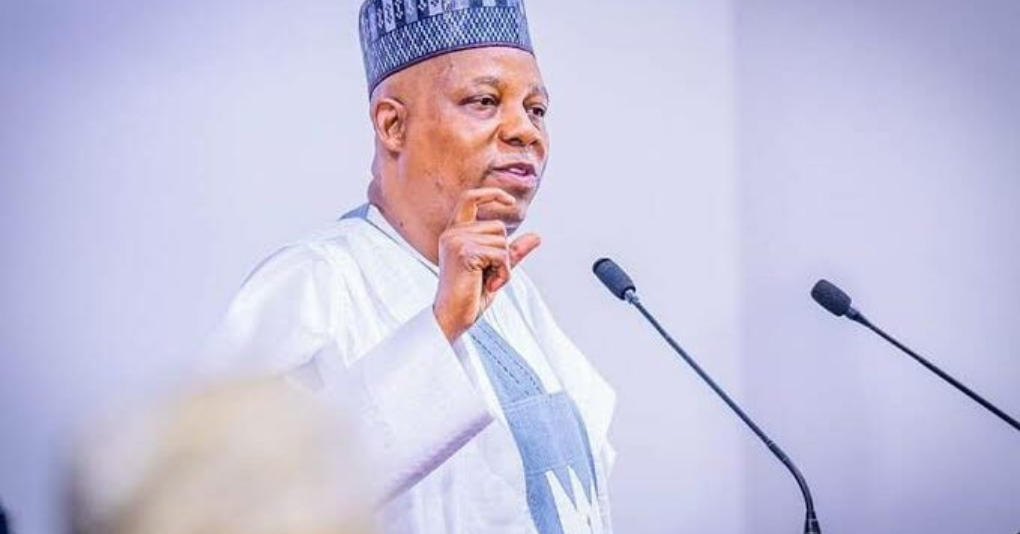Nigeria’s Vice President, Senator Kashim Shettima on Thursday reeled out the present administration’s plans to guarantee the future of Girl-Child in Nigeria.
Senator Shettima who disclosed this in Abuja, while declaring open the 2-day International Conference on Girl-Child education with the theme: ‘Girl Child empowerment through quality education’, tasked State Governments on the need to increase the annual budgetary allocation from the current 14 per cent to 20 per cent.
According to him, Federal Government through the National Economic Council has rolled out plans to guarantee the future of a girl child, by adopting education as one of our critical thematic areas of intervention, alongside health, nutrition and employability in a rapidly changing world.
“The statistics of our out-of-school children in Nigeria are a stark reminder of the urgency of this mission. The latest multiple indicator cluster survey showed that 25.6% of children of primary school age are out of school, and this rate rises to 29.6% for secondary school-age children, each child, abandoned to the streets, is a liability that the nation will one day pay for.
“We must therefore remember that the child who remains out of school today will be a threat to their peer in the classroom tomorrow, and we cannot afford to turn away from this reality, and the need for creative and innovative solutions is now more present than ever.
“The issue of girl child education is for every nation, but in our part of the world, her vulnerability is especially pronounced. Her education is more than a moral obligation. It is the stabilizing force of our economic and social order, for every additional year a girl remains in school, her future earning potential increases, infant mortality rates decrease, and poverty levels in communities fail.
“We see this reflected in the gender parity index, which shows that girls have almost caught up with boys at the primary school level with a ratio of 0.99 and even surpassed boys at the secondary school level with a ratio of 1.08. These gains are, however, at risk unless we intensify our interventions to reach every girl, particularly in areas where barriers remain strongest.
“We have set the ambitious goal of achieving 0.6 score on the World Bank’s human capital index, and we understand that the road to this objective involves increasing years of schooling, improving the quality of education and ensuring that no child, especially no girl child, is left vulnerable or out of school.”
The Vice President who was represented by his Deputy Chief of Staff, Senator Ibrahim Hadejia who cited underscored the need to put deliberate measures in place to address the challenge, said: “Our data further emphasizes the urgency of addressing these issues, particularly in northern Nigeria. States in the North West and North East face the highest out-of-school rates in Kebbi, Zamfara, and Bauchi for example, more than 60% of primary school age children are not in school with Kebbi at a staggering 64.8%. The secondary school numbers are similarly alarming with Bauchi at 66.75% Kebbi at 63.8% and Jigawa, which is my own state, at 62.6%.
“We cannot allow ourselves to be held hostage by these frightening numbers. Now is the time to treat them as an emergency, and the only way forward is to take specific action plans that address the unique needs and barriers in each region.
“Education financing remains a critical aspect of our strategy in the last few years, we have seen a significant increase in education expenditure. For example, in 2022 States spent 1 trillion Naira on education, representing 12% of total expenditures. By 2024, States committed 2.4 trillion to education, while the federal government allocated 2.2 trillion. This brings the combined total allocation to 4.6 trillion naira.
“Although States have 14% of their budgets dedicated to education, we must aim higher. Our campaign to see 15 to 20% of State budget allocated to education is not just a target, but a necessity as it is the surest way to guarantee the future of our children and our nation.
“The stakes are too high for us to hesitate. The risk posed by each out-of-school child should concern us all, and what we need is a concerted, multi sectoral approach. The Federal Government, States, Local Governments, Civil Society and our partners in the donor community must come together with a singular focus, ensuring that every Nigerian child, regardless of gender or geography, receives quality education.
“While the threats before us are real. So too are opportunities to create significant change. This gathering points us towards the way forward. We must combine our advocacy and awareness campaigns as championed by the human capital development program, with practical interventions like increasing budgetary allocation to the education sector. Each stakeholder in this ecosystem, must collaborate and adopt review mechanisms to ensure that our efforts translate into real progress.
“Whatever reforms we adopt to build a safe space for educating the girl child must be championed from within our communities. Policy making involves all of us, and we must engage local leaders, traditional rulers and religious figures to understand the implications of failing to educate the future of this nation.”
In his remarks, Minister of Education, Professor Tahir Mamman who reiterated successive administrations’ commitment towards compulsory education however affirmed that: “things have not worked as we had hoped; as a country, we end up with many children, especially girls, who are out of school.
“The government of President Bola Ahmed Tinubu has taken this as a core responsibility, ensuring that no Nigerian child fails to attend school due to a lack of resources, location, or any other reasons.
“We in the Ministry have the mandate to ensure that the noble goals of the President and the country are actualized, and this is what we have been working on for the last 10 months.
“As I leave this place, we are going to approve a framework that will ensure we deliver this mandate for the country. The mandate, as mentioned, is captured as follows: Transformative Vanguard.
“From today, you will hear a lot about the framework that will deliver and ensure quality education for young people and education that will also allow them to acquire some skills.
“This is the new aspect: by the time a child finishes basic education at secondary school, even without going to university, they will have acquired skills that they can connect with society.
“To the NGF, we want to thank you. We look forward, as I discussed with the DG earlier, to meeting the Governors in the next month to inform and sensitize them about what the Federal Government is rolling out. We also thank the international organizations because addressing issues of out-of-school children is a global phenomenon, not just for Nigeria.
“Once Nigeria gets it right, from what I have seen in my interface with the international community, everybody is optimistic because the figures are either gratifying or down casting,” he noted.
Share this post





Be the first to comment on this post